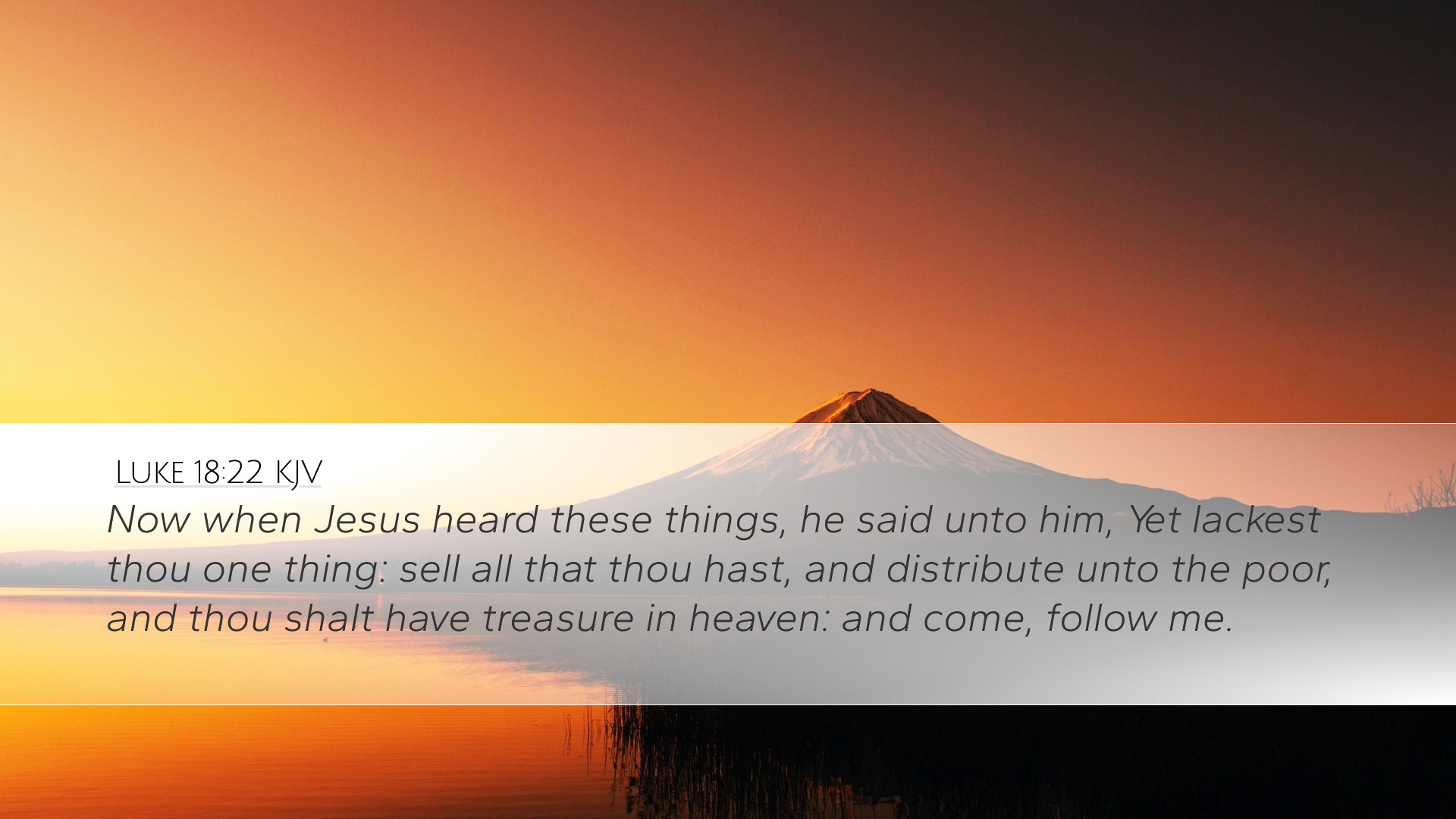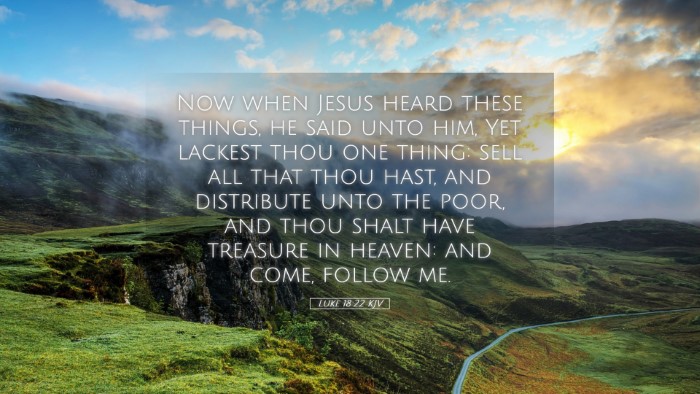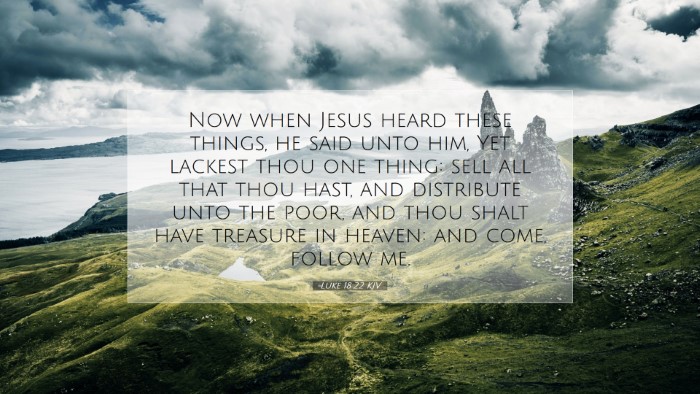Commentary on Luke 18:22
Verse Text: "When Jesus heard this, he said to him, 'You still lack one thing. Sell everything you have and give to the poor, and you will have treasure in heaven. Then come, follow me.'
Introduction
This verse captures a pivotal moment in the interaction between Jesus and a rich ruler who approached Him seeking eternal life. It is a profound lesson on the nature of discipleship and the demands it places on one's possessions and priorities. Notably, this passage has been the subject of extensive commentary and analysis in the tradition of biblical exegesis. Here, we synthesize insights from various public domain commentaries, including those of Matthew Henry, Albert Barnes, and Adam Clarke, to provide a comprehensive understanding of Luke 18:22.
Contextual Analysis
The context of Luke 18 reveals a significant moment in Jesus' ministry as He is on His way to Jerusalem. The question about eternal life, posed by the rich ruler, is foundational to the teachings of Jesus. It is essential to understand the socio-economic realities of first-century Judaism, where wealth was often seen as a sign of God's blessing.
Matthew Henry's Commentary
According to Matthew Henry, this encounter illustrates the difficulty that riches pose in the path of righteousness. He emphasizes that the rich ruler's question—“What must I do to inherit eternal life?”—reflects a common mindset that equates inheritance with personal merit. Jesus’ response reveals the inadequacy of human works and the necessity of divine grace.
Henry notes that the ruler, despite his adherence to the commandments, lacked a critical understanding of true discipleship, which requires total surrender and sacrifice. The phrase "you still lack one thing" highlights the ruler's blind spot—his attachment to material wealth.
Albert Barnes' Commentary
In Barnes’ exposition, he draws attention to the essence of the commandment given by Jesus. The directive to "sell everything" and "give to the poor" speaks profoundly of the radical call to discipleship. Barnes elucidates that this call is not merely for the ruler but serves as a universal principle applicable to all followers of Christ.
Barnes further argues that treasure in heaven represents the eternal rewards that surpass earthly possessions. The idea of following Jesus encompasses a life of service, humility, and often, suffering. He reflects on the inner conflict the ruler must have faced, caught between his worldly wealth and the call to a higher spiritual pursuit.
Adam Clarke's Commentary
Adam Clarke provides additional depth by focusing on the psychological and spiritual implications of Jesus’ command. He traverses the theme of idolatry; wealth can easily become a false god that diverts one from true worship and allegiance to Christ. Clarke emphasizes that Jesus does not condemn wealth per se, but rather the heart that clings to it as a source of security and identity.
Clarke also underlines the radical nature of Jesus’ instructions to the ruler. In Jewish culture, the act of giving to the poor not only fulfills a social duty but also aligns with God’s commandments. This step towards charity is integral to the kingdom's values, resonating with the essence of love for neighbor.
Theological Insights
This verse invites several theological reflections about wealth, discipleship, and the character of God’s kingdom.
Wealth and Discipleship
Each commentator reflects on the inherent tension between material wealth and spiritual wealth. In the teachings of Jesus, wealth is often portrayed as an obstacle to faith. Henry observes that the rich ruler lacked the necessary humility to recognize his spiritual poverty and dependence on God.
Both Henry and Barnes highlight that while material possessions can serve as tools for good, they can also cloud one’s judgment and commitment to Christ. The call to “sell everything” is emblematic of prioritizing the eternal over the temporary.
Eternal Perspective
The concept of "treasure in heaven" articulates a key theme in Christian ethics—valuing eternal life over earthly existence. Clarke reinforces that the tangible rewards of charity resonate with God's nature as loving and generous. In parting with wealth, the ruler would gain a deeper connection with God through acts of love and social justice.
This shift in focus from earthly gain to heavenly investments is essential for understanding the transformative nature of following Christ.
Applications for Today
Understanding Luke 18:22 presents modern believers with vital applications:
- Self-Examination: Reflect on personal attachments to wealth and possessions. Are they hindering spiritual growth?
- Radical Generosity: Embrace the call to give to those in need as a demonstration of faith and love.
- Prioritizing Real Values: Strive to cultivate a worldview that values eternal signs of success over material achievements.
- Community Engagement: Consider how this passage encourages active participation in addressing the needs of the poor and marginalized.
Conclusion
Luke 18:22 serves as a profound reminder of the challenging demands of discipleship that Jesus extends to all of His followers. By examining this verse through the lenses of Henry, Barnes, and Clarke, we glean insights that provoke both personal reflection and broad theological inquiry. The call to sell all, give to the poor, and follow Jesus transcends cultural contexts, urging believers today to live with an eternal perspective and a heart aligned with God’s priorities.


